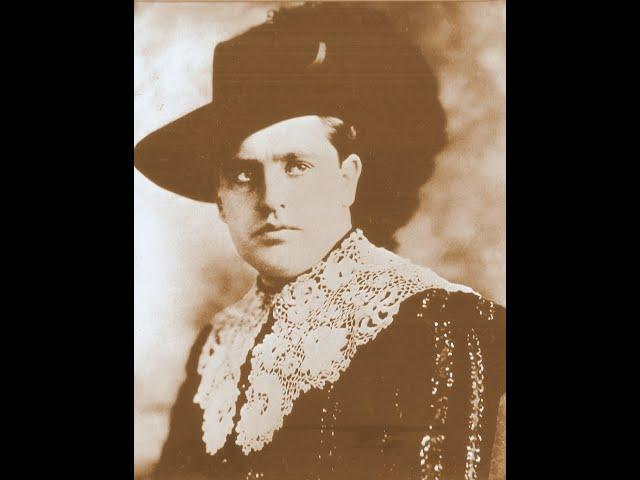
John McCormack - Fra poco a me ricovero (Victor, 1910)
John McCormack (1884-1945) was a legendary Irish tenor who made a lasting mark on the worlds of opera, recital, radio, film and recording. Born in Athlone, County Westmeath, McCormack was the 4th of 11 children born to Scottish parents. After receiving his early education at the Marist Brothers School, he won a scholarship (at age 12) to Summerhill College in County Sligo. Following graduation, McCormack moved to Dublin, determined to become a singer. In early 1903, he was hired for St. Mary’s Church choir, where he met his first voice teacher, organist and composer Vincent O’Brien. That same year, McCormack entered Dublin’s national classical music competition, Feis Ceoil, winning the gold medal.
McCormack’s first overseas engagement was an appearance at the Irish Village of the 1904 St. Louis World’s Fair. Unfortunately, he objected to the buffoonish way in which his countrymen were portrayed and quit the production. Luckily, a hometown fundraiser enabled McCormack to study in Milan, where he arrived in 1905. He began vocal studies with Vincenzo Sabatini, who helped him perfect his technique. His operatic debut (for which he received no pay) was in the title role of Mascagni’s L’Amico Fritz on January 13, 1906 at Savona’s Teatro Chiabrera. The 21 year old tenor, however, was worried about the dependability of his top Bb in Fritz’ act III aria, “O amore”. McCormack enjoyed relating the story of how, instead of actually singing the note, he simply opened his mouth and threw out his arms…receiving an enormous ovation from the audience!
McCormack (using the stage name “Giovanni Foli”) spent the next several months singing in Italy’s smaller theaters, but never making the leap to the major stages. He returned home and next travelled to London, where he tried to get a foothold on the concert circuit. An introduction to Arthur Boosey (of Boosey & Hawkes) led to prestigious bookings, allowing him to build his reputation with the London public. Covent Garden soon showed interest and McCormack made his debut there on October 15, 1907 as Turiddu in Cavalleria Rusticana. At 23, he was the youngest tenor to ever set foot on that stage in a leading role and appeared there regularly until 1914. He received only polite applause at his 1909 debut at Naples’ Teatro San Carlo. After realizing that hiring a claque was mandatory, he managed to overcome a bad start.
On November 10 of 1909, McCormack’s U.S. stage debut took place as Alfredo in La Traviata with Hammerstein’s Manhattan Opera. Alfredo was also his debut role at the Met on November 29 of the following year. Only seven performances of four roles (Alfredo, Rodolfo, Cavaradossi and Pinkerton), plus a trio of concerts made up the tenor’s Met career. A December 26, 1918 performance of Madama Butterfly was his swansong with the company.
McCormack bade farewell to the opera stage after a 1923 Don Giovanni in Monte Carlo and concentrated exclusively on concerts and recitals. Arias, Lieder, chansons, English parlor songs and, of course, old Irish ballads made up the tenor’s enormous repertoire. He was a popular attraction at New York’s Hippodrome, as well as other major concert halls, and was known to give nearly 100 performances in a single season, always to sold out houses.
By the time he reached 40, McCormack was a wealthy man. He had become a U.S. citizen and settled with his wife and children on a lovely Connecticut estate, near Long Island Sound. Throughout the 1920s the tenor remained busy on the concert and recital circuit and continued to record prolifically. McCormack also took advantage of the new medium of radio and starred in the film “Song o’ my Heart” in 1929. He began to slow down during the following decade and announced his retirement in 1938. During the war, however, McCormack did reemerge to make benefit appearances, finally leaving public life for good in 1942. By this time, his health was beginning to fail. The tenor, a longtime smoker, was diagnosed with emphysema. McCormack returned to Dublin to spend his final years, passing away on September 16, 1945. He was just 61 years old.
The great Irish tenor was the complete master of his voice. In his prime, he reached top C and even D (although he used these notes sparingly) and his pianissimi were legendary. Even when his voice was in decline, he had an inborn talent for communicating with his audience, which made him one of the most beloved singers of his generation. He received many honors, including the order of Papal Count, given by Pope Pius XI in 1928. McCormack’s recorded legacy, made for G&T, Odéon, Edison, Columbia and Victor between 1904 to 1942, encompassed some 600 discs. These records document the tenor at every phase of his career, showcasing his talent in everything from operatic arias to sentimental ballads of the era. Here, McCormack sings “Fra poco a me ricovero” from Donizetti’s Lucia di Lammermoor. This was recorded in Camden, NJ for Victor Records on January 3, 1910.
McCormack’s first overseas engagement was an appearance at the Irish Village of the 1904 St. Louis World’s Fair. Unfortunately, he objected to the buffoonish way in which his countrymen were portrayed and quit the production. Luckily, a hometown fundraiser enabled McCormack to study in Milan, where he arrived in 1905. He began vocal studies with Vincenzo Sabatini, who helped him perfect his technique. His operatic debut (for which he received no pay) was in the title role of Mascagni’s L’Amico Fritz on January 13, 1906 at Savona’s Teatro Chiabrera. The 21 year old tenor, however, was worried about the dependability of his top Bb in Fritz’ act III aria, “O amore”. McCormack enjoyed relating the story of how, instead of actually singing the note, he simply opened his mouth and threw out his arms…receiving an enormous ovation from the audience!
McCormack (using the stage name “Giovanni Foli”) spent the next several months singing in Italy’s smaller theaters, but never making the leap to the major stages. He returned home and next travelled to London, where he tried to get a foothold on the concert circuit. An introduction to Arthur Boosey (of Boosey & Hawkes) led to prestigious bookings, allowing him to build his reputation with the London public. Covent Garden soon showed interest and McCormack made his debut there on October 15, 1907 as Turiddu in Cavalleria Rusticana. At 23, he was the youngest tenor to ever set foot on that stage in a leading role and appeared there regularly until 1914. He received only polite applause at his 1909 debut at Naples’ Teatro San Carlo. After realizing that hiring a claque was mandatory, he managed to overcome a bad start.
On November 10 of 1909, McCormack’s U.S. stage debut took place as Alfredo in La Traviata with Hammerstein’s Manhattan Opera. Alfredo was also his debut role at the Met on November 29 of the following year. Only seven performances of four roles (Alfredo, Rodolfo, Cavaradossi and Pinkerton), plus a trio of concerts made up the tenor’s Met career. A December 26, 1918 performance of Madama Butterfly was his swansong with the company.
McCormack bade farewell to the opera stage after a 1923 Don Giovanni in Monte Carlo and concentrated exclusively on concerts and recitals. Arias, Lieder, chansons, English parlor songs and, of course, old Irish ballads made up the tenor’s enormous repertoire. He was a popular attraction at New York’s Hippodrome, as well as other major concert halls, and was known to give nearly 100 performances in a single season, always to sold out houses.
By the time he reached 40, McCormack was a wealthy man. He had become a U.S. citizen and settled with his wife and children on a lovely Connecticut estate, near Long Island Sound. Throughout the 1920s the tenor remained busy on the concert and recital circuit and continued to record prolifically. McCormack also took advantage of the new medium of radio and starred in the film “Song o’ my Heart” in 1929. He began to slow down during the following decade and announced his retirement in 1938. During the war, however, McCormack did reemerge to make benefit appearances, finally leaving public life for good in 1942. By this time, his health was beginning to fail. The tenor, a longtime smoker, was diagnosed with emphysema. McCormack returned to Dublin to spend his final years, passing away on September 16, 1945. He was just 61 years old.
The great Irish tenor was the complete master of his voice. In his prime, he reached top C and even D (although he used these notes sparingly) and his pianissimi were legendary. Even when his voice was in decline, he had an inborn talent for communicating with his audience, which made him one of the most beloved singers of his generation. He received many honors, including the order of Papal Count, given by Pope Pius XI in 1928. McCormack’s recorded legacy, made for G&T, Odéon, Edison, Columbia and Victor between 1904 to 1942, encompassed some 600 discs. These records document the tenor at every phase of his career, showcasing his talent in everything from operatic arias to sentimental ballads of the era. Here, McCormack sings “Fra poco a me ricovero” from Donizetti’s Lucia di Lammermoor. This was recorded in Camden, NJ for Victor Records on January 3, 1910.
Комментарии:
John McCormack - Fra poco a me ricovero (Victor, 1910)
Dead Tenors' Society
Schizophrenia
Osmosis from Elsevier
ASMR Expert Hand Sounds (No Talking)
Trigger Happy ASMR
Dr. Sara Goldrick Rab 03/07/2017
Texas Higher Education Coordinating Board


























